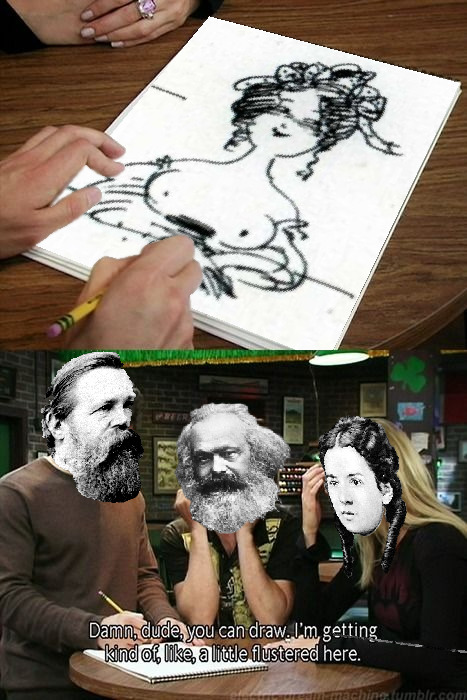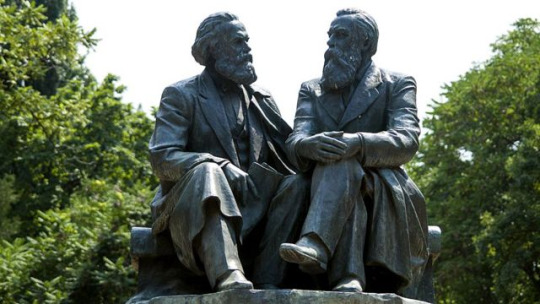#Engels
Text

#karl marx#barbie#communism#margot robbie#computer#2000s#pink#greta gerwig#engels#marxism#marxism leninism
7K notes
·
View notes
Text
Why Gay Sex is Dialectic, an Essay
As a petite proletariat (twink) who reads theory, I was pondering the nature of homosexuality in terms of dialectical materialism, in particular, how gay sex fit into Engel's three laws of dialectics.
Just as Engels posits that internal contradictions or tensions drive change in the law of unity and conflict of opposites, the same could be said for the homoerotic tension of a top-bottom relationship. While tops and bottoms appear to exist as binary oppositional roles, they coexist internally within a relationship. While the duality may give rise to differences in preferences, desires, and dynamics these differences can be resolved through negotiation between the partners. The act of say gex, is thus, the ultimate act of such negotiation, a synthesis of contradictions.
Furthermore, the law of the passage of quantitative changes into qualitative changes could be seen the complications to that top-bottom dynamic. The roles of tops and bottoms can be redefined through the process of negotiation. In fact, surveys from Autostraddle [1] show that the majority of people in a gay relationships are switches, not strictly tops or bottoms. This indicates that the physical designation of top or bottom is thus the result of an accumulation of decisions and preferences, culminating in the qualitative dynamic. This is exemplified by the ways in which masculine-feminine attributes or sub-dom dynamics play a role in gay sex — these attributes, which can be seen as mostly qualitative assignations are the result of the accumulation of quantitative changes.
I would further propose that, through the collaborative dialectic process of negotiation, the social dynamics of gay relationships can change, including that top-bottom dynamic. Engel's law of the negation of the negation captures these changes precisely. The traditional associations between masculinity and feminity, subordination and domination are, to an extent, being subverted in many 21st gay relationships in contrast to the strict gender roles seen in Greco-Roman times [2] or the Tokugawa period [3]. For example, I want a femboy to top me. Whether through the process of resolving contradictions in homosexual intercourse, the top-bottom dynamic or between other qualitative attributes, the process of negation and transformation dialectically results in a more egalitarian understanding of say gex. This is the socialist means of reproduction.
In conclusion, gay sex is praxis.
[1] Riese. “Tops, Bottoms, Switches: One Last Look at All the Survey Data.” Autostraddle, 7 Aug. 2018, www.autostraddle.com/tops-bottoms-switches-one-last-look-at-all-the-survey-data-424953/. Accessed 3 Mar. 2024.
[2] Hubbard, Thomas K. Homosexuality in Greece and Rome : A Sourcebook of Basic Documents. Berkeley, Univ. Of California Press, 2010.
[3] Leupp, Gary P. Male Colors : The Construction of Homosexuality in Tokugawa Japan. Berkeley, University Of California Press, 2011.
173 notes
·
View notes
Quote
The British Constitution cannot exist without the monarchy. Remove the Crown and the entire artificial structure collapses. And the less significant the monarchic element has become in reality, the more significance it has acquired for the Englishman. Nowhere is this non-ruling personification worshipped more than in England. The English journals surpass the German by far in slavish servility. This disgusting cult of the king as such, the worship of a completely emasculated and meaningless notion, not even a notion, but the mere word “king”, is the consummation of monarchy
Engels 1844
971 notes
·
View notes
Text

4K notes
·
View notes
Text
Computer, show me a meme from a timeline where the Internet was more communist in the mid 2000s:

#cosas mias#ustedes son muy chicos por eso no se acuerdan pero todos los memes eran así 'demotivacionales' antes#marx#engels#this would make an excellent unironic motivational poster
282 notes
·
View notes
Text


#soms kom je op fb domme posts tegen en dan zie je dit en dan dit.#van gogh#memes#lucaw.txt#dutchblr#nederblr#engels
108 notes
·
View notes
Note
Came across your blog from the Oliver stories !! :) Your writing is very lovely and honestly I appreciate the existence of your blog! Could I humbly request Engel w/ an insecure male reader? (Specifically insecure on self image)



Engel X Male!Insecure!Reader

☆notes - Hello!! Aww thanks you so much, this makes me so happy!! <3 of course you can! (Don't mind the female character on the gif, I only have this gif😭)
☆content - headcanons of engel x male!reader who's insecure about his self image
☆warnings - none
☆characters - engel


[♡] Engel
Engel was pretty close to you, and he was really friendly to you, always making sure you're comfortable with things etc.
But he noticed how you seemed to put yourself down when it came to your appearance. Even when you did it unconsciously, without noticing.
That made him pretty worried about your mental health and self esteem. He doesn't want you to feel that way about yourself. You're handsome!
Engel would try to talk to you about it without making uncomfortable.
If you didn't want to talk about it, or if Engel couldn't find any good moment to approach you, he'd try to make you feel better with other things.
Something simple like complimenting your hair one day, your smile the other, your hair, and the list goes on...
Engel tries to get you away from anyone who might make you think you're not handsome, because you are and he makes sure you know it!
#✮ zip's works#engel x reader#engels#fpe#fpe engel#fpe x reader#fundamental paper education x reader#fundamental paper education
70 notes
·
View notes
Text
“[T]he anti-authoritarians demand that the political state be abolished at one stroke, even before the social conditions that gave birth to it have been destroyed. They demand that the first act of the social revolution shall be the abolition of authority. Have these gentlemen ever seen a revolution? A revolution is certainly the most authoritarian thing there is; it is the act whereby one part of the population imposes its will upon the other part by means of rifles, bayonets and cannon — authoritarian means, if such there be at all; and if the victorious party does not want to have fought in vain, it must maintain this rule by means of the terror which its arms inspire in the reactionists. Would the Paris Commune have lasted a single day if it had not made use of this authority of the armed people against the bourgeois? Should we not, on the contrary, reproach it for not having used it freely enough?”
— Friedrich Engels, On Authority (1872)

#socialism#communism#marxism#politics#anti capitalism#engels#friedrich engels#anarchism#authority#on authority
124 notes
·
View notes
Text

When it's your boy Freddy's round
69 notes
·
View notes
Text

53 notes
·
View notes
Text

@redbrigadesorg "Imperialism is as much our 'mortal' enemy as is capitalism. That is so. No Marxist will forget, however, that capitalism is progressive compared with feudalism, and that imperialism is progressive compared with pre-monopoly capitalism. Hence, it is not every struggle against imperialism that we should support. We will not support a struggle of the reactionary classes against imperialism; we will not support an uprising of the reactionary classes against imperialism and capitalism."
- V.I. Lenin
#lenin#communism#fuckcapitalism#marxist leninist#stalin#sovietunion#urss#communist#revolutionary war#proletariat#chairman gonzalo#maoism#karl marx#marxism#marxism leninism#marxist#engels
36 notes
·
View notes
Quote
…the landlord in his capacity as capitalist has not only the right, but, in view of the competition, also the duty of ruthlessly making as much out of his property in house rent as he possibly can. In such a society the housing shortage is no accident; it is a necessary institution…
Engels - The Housing Question 1872
1K notes
·
View notes
Text
On Authority
A number of Socialists have latterly launched a regular crusade against what they call the principle of authority. It suffices to tell them that this or that act is authoritarian for it to be condemned. This summary mode of procedure is being abused to such an extent that it has become necessary to look into the matter somewhat more closely.
Authority, in the sense in which the word is used here, means: the imposition of the will of another upon ours; on the other hand, authority presupposes subordination. Now, since these two words sound bad, and the relationship which they represent is disagreeable to the subordinated party, the question is to ascertain whether there is any way of dispensing with it, whether — given the conditions of present-day society — we could not create another social system, in which this authority would be given no scope any longer, and would consequently have to disappear.
On examining the economic, industrial and agricultural conditions which form the basis of present-day bourgeois society, we find that they tend more and more to replace isolated action by combined action of individuals. Modern industry, with its big factories and mills, where hundreds of workers supervise complicated machines driven by steam, has superseded the small workshops of the separate producers; the carriages and wagons of the highways have become substituted by railway trains, just as the small schooners and sailing feluccas have been by steam-boats. Even agriculture falls increasingly under the dominion of the machine and of steam, which slowly but relentlessly put in the place of the small proprietors big capitalists, who with the aid of hired workers cultivate vast stretches of land.
Everywhere combined action, the complication of processes dependent upon each other, displaces independent action by individuals. But whoever mentions combined action speaks of organisation; now, is it possible to have organisation without authority?
Supposing a social revolution dethroned the capitalists, who now exercise their authority over the production and circulation of wealth. Supposing, to adopt entirely the point of view of the anti-authoritarians, that the land and the instruments of labour had become the collective property of the workers who use them. Will authority have disappeared, or will it only have changed its form? Let us see.
Let us take by way of example a cotton spinning mill. The cotton must pass through at least six successive operations before it is reduced to the state of thread, and these operations take place for the most part in different rooms. Furthermore, keeping the machines going requires an engineer to look after the steam engine, mechanics to make the current repairs, and many other labourers whose business it is to transfer the products from one room to another, and so forth. All these workers, men, women and children, are obliged to begin and finish their work at the hours fixed by the authority of the steam, which cares nothing for individual autonomy. The workers must, therefore, first come to an understanding on the hours of work; and these hours, once they are fixed, must be observed by all, without any exception. Thereafter particular questions arise in each room and at every moment concerning the mode of production, distribution of material, etc., which must be settled by decision of a delegate placed at the head of each branch of labour or, if possible, by a majority vote, the will of the single individual will always have to subordinate itself, which means that questions are settled in an authoritarian way. The automatic machinery of the big factory is much more despotic than the small capitalists who employ workers ever have been. At least with regard to the hours of work one may write upon the portals of these factories: Lasciate ogni autonomia, voi che entrate! [Leave, ye that enter in, all autonomy behind!]
If man, by dint of his knowledge and inventive genius, has subdued the forces of nature, the latter avenge themselves upon him by subjecting him, in so far as he employs them, to a veritable despotism independent of all social organisation. Wanting to abolish authority in large-scale industry is tantamount to wanting to abolish industry itself, to destroy the power loom in order to return to the spinning wheel.
Let us take another example — the railway. Here too the co-operation of an infinite number of individuals is absolutely necessary, and this co-operation must be practised during precisely fixed hours so that no accidents may happen. Here, too, the first condition of the job is a dominant will that settles all subordinate questions, whether this will is represented by a single delegate or a committee charged with the execution of the resolutions of the majority of persona interested. In either case there is a very pronounced authority. Moreover, what would happen to the first train dispatched if the authority of the railway employees over the Hon. passengers were abolished?
But the necessity of authority, and of imperious authority at that, will nowhere be found more evident than on board a ship on the high seas. There, in time of danger, the lives of all depend on the instantaneous and absolute obedience of all to the will of one.
When I submitted arguments like these to the most rabid anti-authoritarians, the only answer they were able to give me was the following: Yes, that's true, but there it is not the case of authority which we confer on our delegates, but of a commission entrusted! These gentlemen think that when they have changed the names of things they have changed the things themselves. This is how these profound thinkers mock at the whole world.
We have thus seen that, on the one hand, a certain authority, no matter how delegated, and, on the other hand, a certain subordination, are things which, independently of all social organisation, are imposed upon us together with the material conditions under which we produce and make products circulate.
We have seen, besides, that the material conditions of production and circulation inevitably develop with large-scale industry and large-scale agriculture, and increasingly tend to enlarge the scope of this authority. Hence it is absurd to speak of the principle of authority as being absolutely evil, and of the principle of autonomy as being absolutely good. Authority and autonomy are relative things whose spheres vary with the various phases of the development of society. If the autonomists confined themselves to saying that the social organisation of the future would restrict authority solely to the limits within which the conditions of production render it inevitable, we could understand each other; but they are blind to all facts that make the thing necessary and they passionately fight the world.
Why do the anti-authoritarians not confine themselves to crying out against political authority, the state? All Socialists are agreed that the political state, and with it political authority, will disappear as a result of the coming social revolution, that is, that public functions will lose their political character and will be transformed into the simple administrative functions of watching over the true interests of society. But the anti-authoritarians demand that the political state be abolished at one stroke, even before the social conditions that gave birth to it have been destroyed. They demand that the first act of the social revolution shall be the abolition of authority. Have these gentlemen ever seen a revolution? A revolution is certainly the most authoritarian thing there is; it is the act whereby one part of the population imposes its will upon the other part by means of rifles, bayonets and cannon — authoritarian means, if such there be at all; and if the victorious party does not want to have fought in vain, it must maintain this rule by means of the terror which its arms inspire in the reactionists. Would the Paris Commune have lasted a single day if it had not made use of this authority of the armed people against the bourgeois? Should we not, on the contrary, reproach it for not having used it freely enough?
Therefore, either one of two things: either the anti-authoritarians don't know what they're talking about, in which case they are creating nothing but confusion; or they do know, and in that case they are betraying the movement of the proletariat. In either case they serve the reaction.
- Engels, 1872
179 notes
·
View notes
Text
So I started Nier Automata

166 notes
·
View notes

